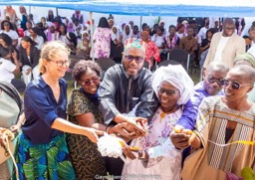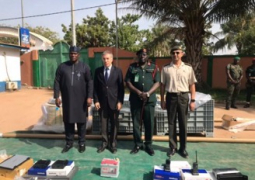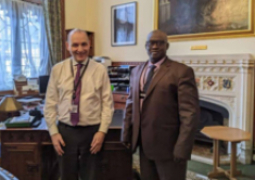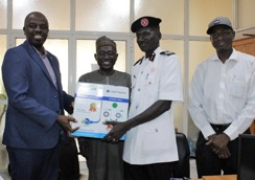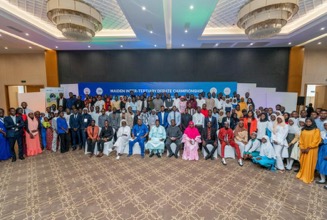
The debate held at the Sir Dawda Kairaba International Conference Centre was funded by UNODC under its PROMIS project. The Promis Project is aimed at “Strengthening the capacities of West African states to develop a human rights-based response to smuggling of migrants and to effectively respond to human rights violations related to irregular migration (PROMIS.) The project is supported by the Government of the Netherlands and implemented by the United Nations Office on Drugs and Crime (UNODC) jointly with the Office of the United Nations High Commissioner for Human Rights (OHCHR).
The theme for this year’s debate was ‘Multi-stakeholders’ approaches: putting youth at the centre of the migrant smuggling and trafficking in persons discourse’ with the soul aim of involving the youth in the fight against human trafficking and smuggling of migrants in The Gambia.
The debate provided high school and university students the platform to express themselves regarding societal issues that can potentially lead them to frustration; eventually, leading to a decision to take the back-way; or becoming vulnerable and falling victims to human traffickers.
Speaking to the participants, Baboucarr Ismaila Joof, Minister of Trade, Regional Integration and Employment described the debate as important and timely given the increasing number of youth embarking on irregular migration to Europe, often resulting in several deaths.
"Trafficking in persons and smuggling of migrants are global and widespread crimes that affect men, women and children in different ways. Although the two are sometimes linked, they are separate crimes that pose a serious threat to human rights, human security, development, and the rule of law," he said.
He added: “Trafficking in person is a crime. It is a human rights abuse.” However, he said these crimes are lucrative to organised criminal groups involved in the menace.
Minister Joof further said that due to the lucrative nature of trafficking in persons, criminal groups will always apply all means to succeed. He therefore called for the need for multi-sectoral partnership and multi-dimensional approach to combat the menace.
He said government has enacted a law that prevents, suppresses and punishes human traffickers, adding currently plans are underway to enact another law that will criminalise smuggling of migrants and punish culprits.
"The Anti-Smuggling Bill is already developed and the process of submitting it to cabinet for approval is underway," he affirmed.
The Employment Minister also said factors responsible for irregular migration are many but lack of economic opportunities is usually the factor behind it.
“The Ministry has formulated a National Employment Policy and Action Plan (NEAP) 2022-2026. With this policy, the government targeted to create 150, 000 jobs by the end of 2026,” he said.
Emmanuel Daniel Joof, guest speaker from the National Human Rights Commission, said trafficking in persons and smuggling of migrants is a gross violation of human rights, noting that several youth had perished in the sea and the Sahara Desert while travelling to Europe for greener pastures.
He said to combat human trafficking and smuggling of migrants the government must empower the youth with the needed skills and knowledge to boost their job opportunities.
Representing the Minister of Justice, Alieu Jallow, Curator of Interstate Estate at the Ministry of Justice said his Ministry is committed to ensuring that the necessary legal frameworks are put in place to criminalise both human trafficking and smuggling of migrants.
Amie Sohna, president of UTG-Debate Association said the association aims to foster dialogue, exchange knowledge and build partnerships among government, civil society organisations, academia and youth.
Fatou Geo Barry, national project officer for the PROMIS Project in The Gambia said the youth have the power to change their future.
She assured that the PROMIS project will continue to engage and work with relevant stakeholders to effectively prevent human trafficking and migrant smuggling amongst the young population.
“Many young people are leaving the country, and we need to educate everyone about the potential risks,” she said.


